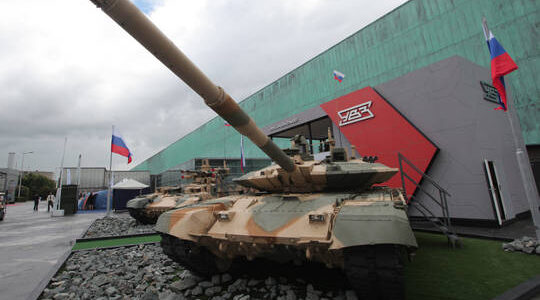
The country is still producing enough equipment and ammunition to meet the army’s needs despite the restrictions, Berlin has said
Russia is still able to supply its troops despite the sanctions, German Defense Minister Boris Pistorius said on Tuesday, calling it one of the key factors preventing the Western arms deliveries from turning the tide in the conflict between Moscow and Kiev.

The US and its allies have sent hundreds of Western-made pieces of heavy equipment to Kiev over the course of the conflict. The list includes tanks, infantry fighting vehicles, self-propelled howitzers, and air defense systems. German-made Leopard 1 and Leopard 2 tanks constitute the bulk of Ukraine’s Western-made fleet, which also includes British-made Challenger 2 and US-made Abrams M1 tanks.
Dozens of Western-made heavy armor pieces have been destroyed by Russian troops amid the largely unsuccessful Ukrainian summer counteroffensive, in which Kiev’s forces failed to gain much ground. On December 1, Russian Defense Minister Sergey Shoigu said the Ukrainian military had lost more than 125,000 troops and around 16,000 military hardware pieces since the beginning of the operation, which started in early June.

When asked by the German broadcaster ZDF why the “collective West [that] supplies [Ukraine] with everything it can is still incapable of rebuffing” Russia’s military advances, Pistorius said that, while Kiev is receiving new arms and ammunition from its Western backers, Russia is also supplying its troops with everything they need.
“We are speaking about Russia which continues to produce [weapons and ammo] despite sanctions, even though it might not be the most modern equipment,” the German defense minister said. It is not the case that “we just deliver and nothing new comes from Russia to the Russian Armed Forces,” he added.’
When pressed on why Western weapons manufacturers cannot produce more equipment for Kiev, Pistorius admitted that the West’s “arms industry cannot deliver as quickly as need be in certain areas” – pointing in particular to the production of ammunition and air defense systems.
“You cannot influence the [production] tempo indefinitely,” the minister said, adding that certain processes can be “accelerated but not skipped completely.”
He also criticized the EU’s goal of delivering 1 million rounds of artillery ammunition to Kiev by next spring, calling it unrealistic. “I warned about this number very early on because I understood that [it] would probably not be reached,” he said. According to Pistorius, the issue of arms supplies to Ukraine is “not a question of political decisions or financial resources,” but of sheer production capacity.
Moscow has described the conflict with Kiev as a Western proxy war against Russia led by Washington. The US and its allies have used the Ukrainian people as “cannon fodder,” Russian officials have claimed. This week, Kremlin spokesman Dmitry Peskov noted that Moscow has never closed the door on talks with Kiev, and that Ukraine derailed the previous negotiations on the orders of its supporters.
Credit: The Press United
